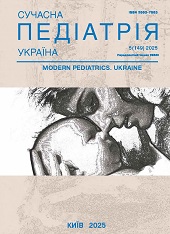A rare case of neonatal pneumonitis with de novo mutation of surfactant protein (SFTPC)
DOI:
https://doi.org/10.15574/SP.2025.5(149).157159Keywords:
children, neonatal pneumonitis, surfactant protein mutations, diagnostics, exome sequencingAbstract
Interstitial diseases of the respiratory system in children of the first two years of life remain an important medical and social problem due to the multifaceted clinical forms, the complexity of early diagnosis, and the severe course.
Aim - to provide information on the ways of timely diagnosis of neonatal pneumonitis.
Clinical case. The history of the disease of a boy I. aged 3 months with a clinic of severe respiratory failure is presented. The dynamics of clinical manifestations and the results of additional examination are analyzed. Since birth, muscle hypotension, poor sucking, and insufficient weight gain have been noted. X-ray of the chest organs did not reveal any changes. Computed tomography (CT) of the chest organs revealed signs of bilateral pneumonia of the “ground glass” type. A positive PCR result for metapneumovirus was obtained. Neonatal screening, 3B-EXOME (exome sequencing, PCR for respiratory pathogens, comprehensive immunological profile, bacteriological studies of blood and urine, bronchoscopy, ECG, EchoCG, CT scan of the brain, ultrasound of internal organs - no pathology. WES (whole-exome sequencing) revealed a heterozygous de novo mutation c.185A>C p.(Gln62Pro) in the SFTPC gene - a pathogenic variation that affects the BRICHOS domain of surfactant protein C. The diagnosis was confirmed at the age of 11 months. Tracheostomy was performed, CPAP (Continuous Positive Airway Pressure) therapy was prescribed, enteral feeding through a gastrostomy. Maintenance therapy was prescribed: hydroxychloroquine, azithromycin, amlodipine, inhalations. After 6 months - stable condition, without the need for CPAP, with oxygen supply 1 L/min. Vaccinated according to the extended schedule (PCV-20, MEN-B, RSV, MEN-ACWY, influenza).
Conclusion. Due to the ability to quickly establish the etiology of the disease, genetic analysis methods, namely WES or WGS, contribute to reducing the number of unnecessary examinations, shortening the length of hospital stay and ensuring the timely initiation of specific treatment.
References
Brasch F, Griese M, Tredano M et al. (2004). Interstitial lung disease in a baby with a de novo mutation in the SFTPC gene. Eur Respir J. 24: 30. https://doi.org/10.1183/09031936.04.00000104; PMid:15293602
Guillot L, Epaud R, Thouvenin G et al. (2009). New surfactant protein C gene mutations associated with diffuse lung disease. J Med Genet. 46: 490. https://doi.org/10.1136/jmg.2009.066829; PMid:19443464
Nogee LM. (2002). Abnormal expression of surfactant protein C and lung disease. Am J Respir Cell Mol Biol. 26: 641. https://doi.org/10.1165/ajrcmb.26.6.f241; PMid:12034561
Downloads
Published
Issue
Section
License
Copyright (c) 2025 Modern pediatrics. Ukraine

This work is licensed under a Creative Commons Attribution-NonCommercial 4.0 International License.
The policy of the Journal “MODERN PEDIATRICS. UKRAINE” is compatible with the vast majority of funders' of open access and self-archiving policies. The journal provides immediate open access route being convinced that everyone – not only scientists - can benefit from research results, and publishes articles exclusively under open access distribution, with a Creative Commons Attribution-Noncommercial 4.0 international license (СС BY-NC).
Authors transfer the copyright to the Journal “MODERN PEDIATRICS. UKRAINE” when the manuscript is accepted for publication. Authors declare that this manuscript has not been published nor is under simultaneous consideration for publication elsewhere. After publication, the articles become freely available on-line to the public.
Readers have the right to use, distribute, and reproduce articles in any medium, provided the articles and the journal are properly cited.
The use of published materials for commercial purposes is strongly prohibited.

